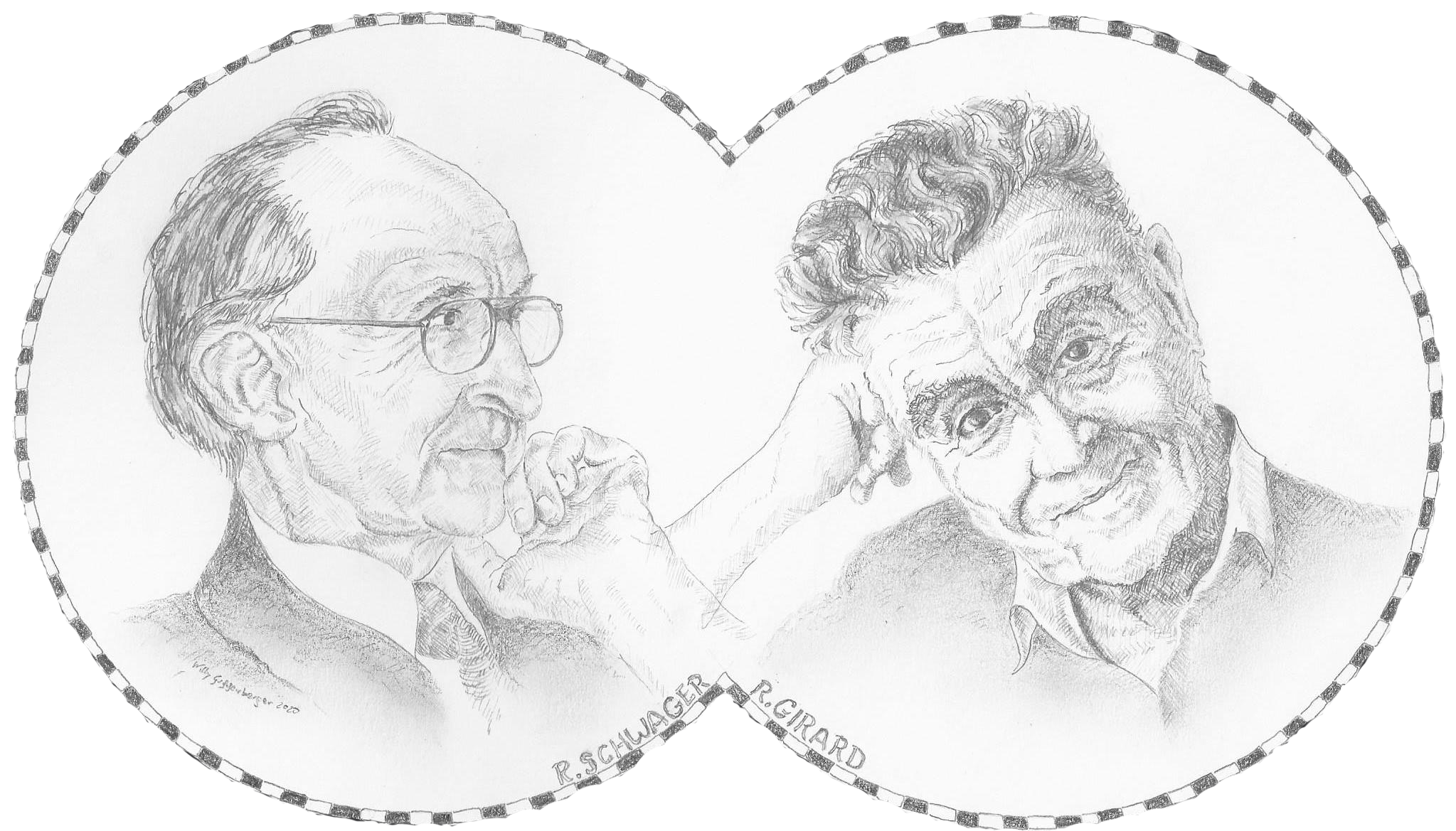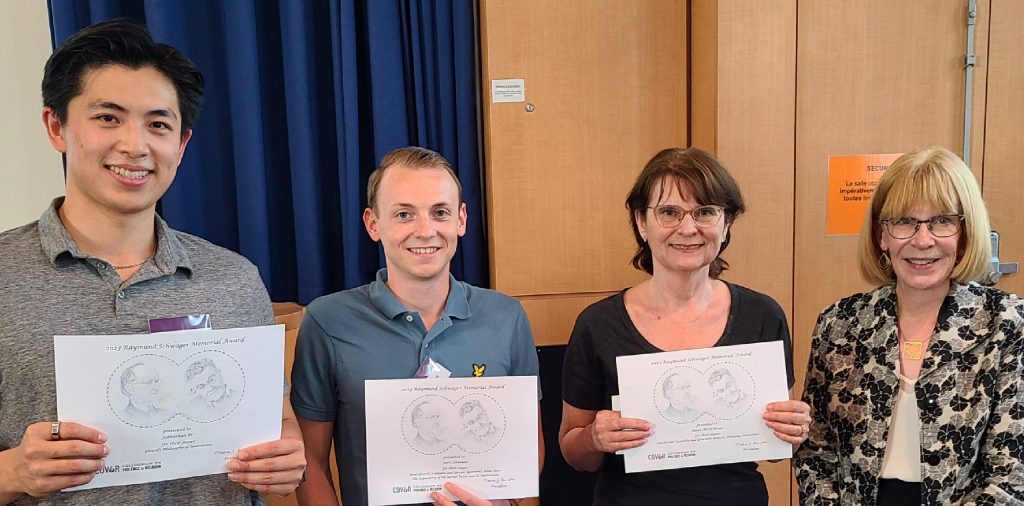The Raymund Schwager Memorial Award

To honor the memory of Raymund Schwager, SJ (+ 2004), the Colloquium on Violence and Religion offers an award of $ 1,500 shared by up to three persons for the three best papers given by graduate students at the COV&R annual meeting. Students presenting papers at the conference are invited to apply for the award. In addition to the prize money, the winners’ registration fee is waived. Winners are announced in the conference program. Prize-winning essays should reflect an engagement with mimetic theory; they will be presented in a plenary session and be considered for publication in Contagion. The winner(s) are selected by a three-person panel consisting of one of the conference organizers, the editor of Contagion, and the President of the Colloquium.
Schwager was a theologian at the University of Innsbruck whose friendship with René Girard proved pivotal for the work of both men and for the development of mimetic theory. His book Brauchen Wir Einen Sündenbock? (1978, published in English as Must There Be Scapegoats? in 1987) was the first to interpret the Bible in light of Girard’s mimetic hypothesis. His later writings developed an understanding of Christian revelation known as “Dramatic Theology.”
Schwager was a co-founder of the Colloquium on Violence & Religion (1991), its first president (1991–1995), and an honorary member of its advisory board from 1999 until his unexpected death on 27 February 2004. The award was established in his honor in 2005.
Editor’s note: If you know the names of winners from years not currently listed, please email them to Maura Junius, so they can be added.
2023 – Paris, France

Winners of the Raymund Swagger Memorial Essay Contest addressed a broad range of topics. Jonathan Bi (first place) presented his paper Girard’s Philosophy of Innovation. Bart Leenman‘s paper explored René Girard’s Scapegoat and Giorgio Agamben’s Homo Sacer- The Asymmetry of the Sacred Victim and its Implications. Susan McElcheran examined Intellectual Disability and Girardian Mimesis: Emerging Connections.
2022 – Bogota, Colombia
The first Annual Meeting in South America yielded three very interesting papers. Lysius Ketler presented Haiti Between Liberation and Salvation: Contributions to Mimetic Theory. Arron Merat‘s paper asked Are Networked Publics Stoking the Secret Power of Lawlessness. Gustavo Adolfo Sanabria Galvis provided A Girardian Reading of the Revolution and the Death of God in A Farewell to Arms and One Hundred Years of Solitude.
2021 – Lafayette, Indiana USA
The online Annual Meeting introduced new scholarship. Christopher Anton Mueller presented his paper History as Crisis and a Mimetic Philosophy of History. Todd John Wallenius discussed ‘Sir, what is the meaning of culture?’ Modern education, symbolic violence, and civil war in Nepal in his presentation.
2019 – Innsbruck, Austria
Iván Camilo Vargas Castro discussed Border citizenships: Justice and hospitality in the border region between Colombia and Venezuela. J. Columcille Dever revealed Envy Loves to Hide: Chrysostom Unmasking Envy on Cain’s Fallen Face, Our Fallen Nature. Domèbèimwin Vivien Somda detailed Immigration: Transforming tragedy into drama according to René Girard and Raymund Schwager.
2018 – Denver, Colorado
In 2018 all winning essays were judged equally meritorious. No 1st-3rd prize awards were given; rather, the cash prize was shared equally among the three winners. The authors and their winning essays are Jason Archbold for What Colonel Kurtz Sees When “Looking at it”, or Myth and the Violence of Honesty; Cheongsoo Park for David Cuts off a Corner of Saul’s Cloak: Reading the Cave Encounter Between Saul and David as Mimetic Rivalry; and Simon Skidmore for his essay A Mimetic Reading of Exodus 4:24-26.
2017 – Madrid, Spain
Lyle Enright’s essay Girard, Agamben, and the Glory of the Lord, winner of this year’s Raymund Schwager Memorial Prize, laid down lines of fruitful exchange between the work of these two thinkers.
2016 – Melbourne, Australia
Winners of the Raymund Schwager Memorial Essay Prize also captivated listeners, with impressive papers: Yevgen Galona (first place) spoke on the politics of victimhood in ecclesiastical discourse of the high medieval period. Elizabeth Culhane (second) explored the question, Are women of faith uniquely violent? And Lukasz Mudrak (third) looked at the correlation of Girard and Schwager’s thinking about the Holy Spirit.
2015 – St. Louis, Missouri USA
Chelsea King won first place with her essay Girard Reclaimed: Finding Common Ground between Sarah Coakley and René Girard on Sacrifice. The second place essay,‘The Terrible Speed of Mercy’: Mimetic Theory and Asceticism In Flannery O’Connor’s The Violent Bear It Away, was written by Megan Brueske. Michael VanZandt Collins was awarded third place for his essay Girard, Ghazālī, and a Disciplined Mimetic Desire: Towards a Constructive Dialogue with Muslims.
2014 – Munich, Germany
Award winners were Pedro Sette-Câmara, Bernard Disco, Simon De Keukelaere and Markus Wierschem.
2013 – Northern Iowa USA
First place was awarded to Ryan Duns for his essay The Lord has Made All Things for Himself: Creatio Ex Nihilo and the Ecological Imagination. Daniel London received second place for The River’s Ministry: Bede’s Passion of St. Alban in Light of Mimetic Theory. Third place was awarded to Chelsea King for her essay The Eucharist Through a Girardian Lens.
